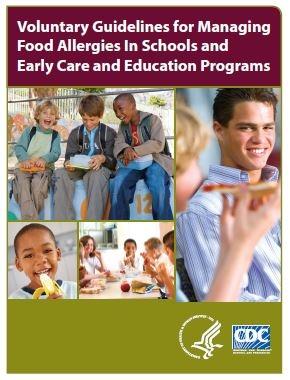CDC National School Food Allergy Guidelines
Ensure your school’s policies are in line with federal and state laws that protect children who live with food allergies.
On October 30, 2013, the Centers for Disease Control & Prevention (CDC) published “Voluntary Guidelines for Managing Food Allergies in Schools and Early Care and Education Programs”—the first national comprehensive guidelines for school food allergy management.

The CDC guidelines seek to protect the physical and emotional health of students with food allergies by providing practical information and strategies for schools while reinforcing federal laws and regulations. The guidelines are intended to support the implementation of school food allergy management policies in schools and early childhood programs, and guide improvements to existing practices. Implementing these guidelines may help schools reduce allergic reactions, improve response to life-threatening reactions, and ensure current policies are in line with laws that protect children with serious health issues.
The guidelines were created as the result of the Food Allergy & Anaphylaxis Management Act (included under the FDA’s Food Safety Modernization Act), which was championed by FARE and signed into law on Jan. 4, 2011. The law required the U.S. Secretary of Health and Human Services to develop and make available to schools a voluntary policy to manage the risk of food allergy and anaphylaxis in schools. FARE, the National Association of School Nurses and other groups collaborated with the CDC on the development of these guidelines.
Supplemental Resources
A Letter from FARE to School Leaders
This message from FARE staff provides an overview of the CDC’s 2013 national guidelines for managing food allergies in the school setting. Download and send to your school.
Keeping Children with Food Allergies Safe at School
A one-page download of important recommendations from the CDC guidelines.
Recommended Practices for Reducing the Risk of Exposure to Food Allergens and Responding to Food Allergies in Schools and Early Childhood Education Programs
A two-page download of recommended practices and accommodations for the classroom, cafeteria, transportation, school events, and physical education and recess.
Food Allergies: What PTOs and PTAs Need to Know
A one-page download of food allergy tips and recommended practices for Parent-Teacher Organizations (PTOs) and Parent-Teacher Associations (PTAs)
Actions for School Boards
can adopt written policies that direct and support clear, consistent, and effective practices for managing the risk of food allergies and responding to food allergy emergencies.
Actions for School District Administrators
can provide direct assistance to schools to help them meet the needs of students with food allergies, especially when the school does not have key staff, such as a doctor or a full-time registered nurse.


